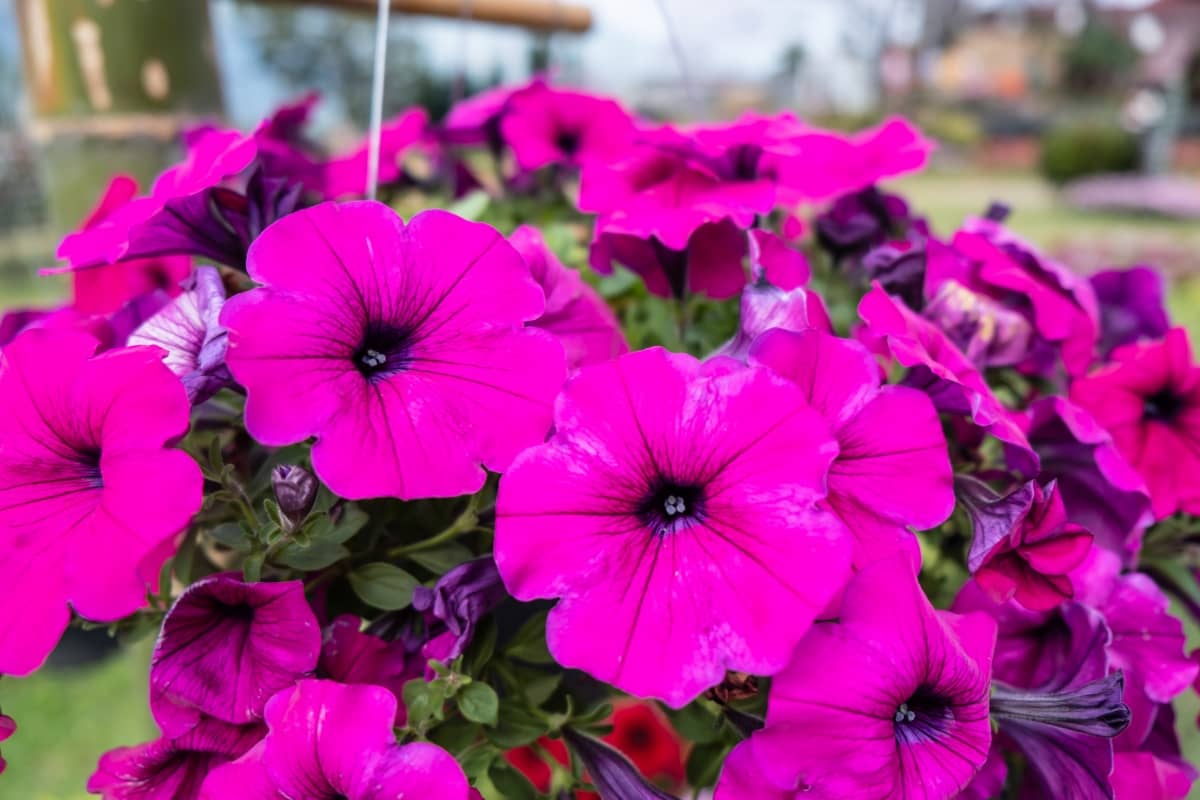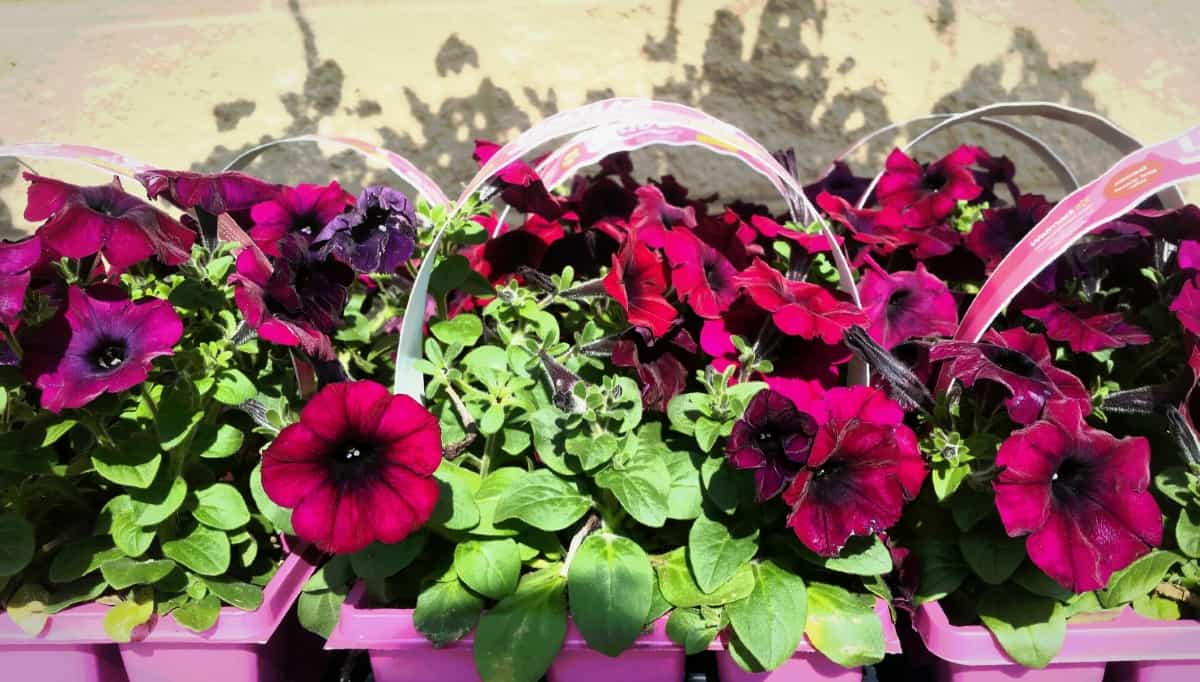Petunias are popular, colorful, and versatile flowering plants that are a favorite among gardeners. These annuals thrive in various conditions, making them ideal for garden beds, hanging baskets, and container gardens. However, to ensure that they grow vigorously and produce abundant blooms, providing them with the right nutrients is essential.

This article will discuss the best fertilizers for petunias, as well as when and how to apply them to optimize the growth and performance of your plants. We will learn about organic and synthetic fertilizers, their NPK ratios, and the specific fertilization requirements of petunias.
Best Fertilizer for Petunias
When and How to Apply Fertilizer to Petunias
Petunias generally require consistent fertilization throughout their growing season, which extends from spring until the first frost in autumn. Following a proper fertilization schedule and technique is crucial to ensure your petunias receive the necessary nutrients and maintain their vibrant blooms. The following guidelines will help you understand when and how to apply fertilizer to your petunias:
Start with well-prepared soil: Prepare the soil before planting petunias. To boost soil nutrients, structure, and water-holding capacity, add compost or well-rotted manure. Additionally, you may incorporate a slow-release fertilizer into the soil to provide an initial nutrient boost.
Fertilize at planting time: When transplanting petunias into your garden or container, apply a balanced, slow-release fertilizer. This will promote healthy root growth and deliver nutrients throughout the season.
Regular feeding throughout the growing season: Petunias require consistent fertilization to maintain their vibrant blooms and vigorous growth. Fertilize your plants with a water-soluble fertilizer every two to four weeks. This regular feeding will ensure that your petunias receive the necessary nutrients for optimal growth and performance.
Adjust fertilization based on plant performance: Monitor your petunias’ growth and adjust the fertilization schedule as needed. If your plants appear healthy and produce abundant blooms, you may reduce the frequency of fertilization. Conversely, if your petunias appear stressed or are not blooming as desired, you may need to increase the frequency or switch to a fertilizer with a different NPK ratio.
Organic vs. Synthetic Fertilizers for Petunias
Organic and synthetic fertilizers may nourish petunias but vary in content, mode of action, and environmental effect. We’ll compare these two fertilizers for petunias below:
Organic Fertilizers
Organic fertilizers come from plant and animal wastes, minerals, and organic debris. They release nutrients slowly and steadily, providing a sustained supply of nutrients to your petunias. Organic fertilizers improve soil structure, promote microbial activity, and lower the risk of burning plants due to their gentle action. Examples of organic fertilizers for petunias include compost, aged manure, bone meal, fish emulsion, and alfalfa meal.
Synthetic Fertilizers
Synthetic fertilizers are man-made and contain specific ratios of essential nutrients, such as nitrogen, phosphorus, and potassium (NPK). They are highly concentrated and provide a rapid nutrient boost to plants, making them ideal for correcting nutrient deficiencies or supporting rapid growth. However, synthetic fertilizers may cause harm to beneficial soil organisms, contribute to nutrient leaching and runoff, and increase the risk of plant burn if applied excessively or improperly. Examples of synthetic fertilizers for petunias include water-soluble granules and slow-release pellets with specific NPK ratios.
In case you missed it: The Best Fertilizer for Peonies: When and How to Apply

Understanding NPK Ratios
The NPK ratio on a fertilizer package represents the percentages of nitrogen (N), phosphorus (P), and potassium (K) in the product, in that order.
- Nitrogen (N) promotes leaf and stem growth and gives plants their vibrant green color.
- Phosphorus (P) supports root development and flower and fruit production.
- Potassium (K) aids overall plant health, enhances disease resistance, and regulates water and nutrient movement in plant cells.
For petunias, a balanced NPK ratio such as 10-10-10 or a high-phosphorus formula like 10-20-10 is often recommended. The balanced formula provides equal amounts of each essential nutrient, supporting overall plant health. The high-phosphorus formula boosts flower production, making it ideal for petunias grown primarily for their colorful blooms.
Applying Fertilizer to Petunias
- Read the product label: If you want to know how much fertilizer to use and how frequently to apply it, you need to read the label. Over-fertilizing can cause harm to your plants and the environment.
- Apply evenly: Avoid getting fertilizer on the leaves and stems by spreading it around the plant’s base. This will prevent leaf burn and ensure the roots can easily access the nutrients.
- Water thoroughly: After applying fertilizer, water your plants thoroughly. This will help dissolve the fertilizer and carry the nutrients into the root zone.
- Monitor plant health: Keep an eye on your petunias after fertilizing. Signs of over-fertilization include yellowing leaves, reduced growth, or scorched leaf tips.
Petunia Fertilization Requirements
Petunias have specific fertilization requirements to ensure optimal growth and blooming. They require a steady supply of nutrients throughout the growing season, with a particular emphasis on phosphorus to support flower production.
- Soil preparation: Start with well-amended soil rich in organic matter. This provides a good foundation for your petunias and ensures that the soil has adequate nutrients, water-holding capacity, and aeration.
- Regular feeding: Apply a balanced, slow-release fertilizer at planting time, followed by regular applications of a water-soluble fertilizer every two to four weeks throughout the growing season. This will provide consistent nutrients to support your petunias’ growth and blooming.
- Adjusting fertilization: Monitor your petunias and adjust fertilization as needed. If your plants are growing vigorously and producing abundant blooms, you may reduce the frequency of fertilization. If they appear stressed or are not blooming as desired, increase the frequency or switch to a high-phosphorus fertilizer.
In case you missed it: The Best Fertilizer for Hydrangea: When and How to Apply

Conclusion
Proper fertilization is crucial for the optimal growth and blooming of petunias. Both organic and synthetic fertilizers can provide the necessary nutrients, but it’s essential to understand their differences and to choose a product with the right NPK ratio for your petunias. Regular feeding, adjusting fertilization based on plant performance, and following the correct application techniques will ensure your petunias thrive and produce abundant, vibrant blooms. Your petunias can be a colorful and rewarding addition to your garden with some care and attention.
- Feed Your Flock for Less: Top 10 Tips to Save on Chicken Feed
- Ultimate Guide to Ossabaw Island Hog: Breeding, Raising, Diet, and Care
- Hatching Answers: The Top 10 Reasons Your Chickens Aren’t Laying Eggs
- Eggs and Economics: Breaking Down the Cost of Raising Backyard Chickens
- Defend Your Greens: Proven Methods to Keep Iguanas Out of Your Garden
- Ultimate Guide to Cinnamon Queen Chicken: A Comprehensive Guide for Beginners
- Ultimate Guide to California Tan Chicken: Breeding, Raising, Diet, Egg-Production and Care
- Ultimate Guide to Marsh Daisy Chicken: Breeding, Raising, Diet, and Care
- 10 Types of Chicken Farming Businesses You Can Start for Profits